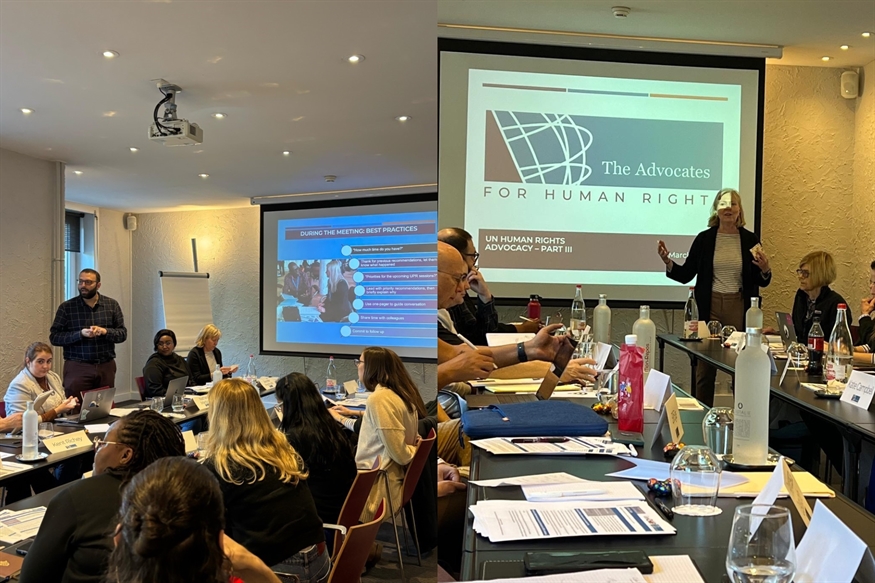The Advocates in Geneva: Highlights from the 49th Spring Session of the UPR
 Photos from our 'UN Advocacy Training' in Geneva.
Photos from our 'UN Advocacy Training' in Geneva.
The Advocates sent a team of staff and volunteers to Geneva, Switzerland, to advocate on our core issues for the 49th Session of the Universal Periodic Review (UPR). The UPR provides a unique platform where peer pressure and public scrutiny from fellow states can spark significant reform. Research shows that the UPR plays a critical role in influencing states to abolish the death penalty. For example, Sierra Leone and Armenia made moves toward abolition shortly after their UPR outcomes, highlighting the review’s powerful impact on policy change. We submitted and presented reports on many different countries for this UPR session. These reports can be read here.
On February 27th, our team—alongside panelists
from Reprieve, the International Commission of Jurists-Kenya, and the World Coalition Against the Death Penalty—hosted a side event to the Human Rights
Council Session 58 on UPR recommendations and on-the-ground realities
for women on death row or at risk of experiencing gender discrimination in
capital cases in Kenya, Kuwait, Laos, and other efforts toward abolition
in Grenada, Guinea, Guyana, Kiribati, and Lesotho. During the
panel, we highlighted the importance of an intersectional approach to
abolishing the death penalty. We also stressed the need for comprehensive
information regarding individuals sentenced to death. Many of our partners
advocate for data that is disaggregated by sex/gender, nationality, crime of
conviction, and their relationships to any co-defendants or victims.
On March 2nd, we hosted an advanced UN advocacy training in Geneva to equip community leaders, human rights defenders, partner organizations, and volunteers with the tools necessary to engage strategically with the UN. This training covered:
- Navigating UN buildings and procedures
- Hands-on practice with delivering oral statements effectively
- Presenting your priorities clearly and other best practices
- Mock meetings with UN Human Rights Council delegates
Attendees of this training, including many grassroots
leaders and organizations, had their technical knowledge strengthened, which in
turn helped them better advocate and fight for human rights issues.
This session was also a chance for our team to meet with and collaborate with many of our partners and partner organizations. With our partners Clara Serra Baiget of Women Link Worldwide, and women’s rights expert Elif Ege of Türkiyewe met with diplomats from UN member countries and asked them to recommend that Spain and Türkiye adopt stronger legal frameworks to protect women and girls, provide accessible support services, and implement effective prevention. Our staff and volunteers also advocated to combat gender-based violence in Guinea with information from the Guinean diaspora in the United States.
We also collaborated with human rights defender Khaleem Ali and the organization ÜniKuir in advocating for LGBTIQ+ rights in Grenada, Guyana, and Türkiye. We worked on the ground in Geneva to ensure that Human Rights Council delegations used the Universal Periodic Review (UPR) to pressure the governments of Grenada, Guyana, and Türkiye to end discrimination and violence based on sexual orientation and gender identity and expression and to secure urgent legal reforms that protect and affirm the rights of LGBTIQ+ individuals. Our staff and volunteers further advocated for LGBTIQ+ rights in Armenia, Guinea, Kenya, Kiribati, and Lesotho and brought the priorities of our in-country partner organizations to meetings with delegations to the Human Rights Council.
In addition to advocacy in advance of the upcoming UPR, we
also advocated at the Human Rights Committee—a critical human rights body upholding civil and political rights. We
participated in briefings, delivered statements, and answered questions from
Committee members about gender-based violence in Montenegro, the death penalty
in Burkina Faso, and resentencing of people previously on death row in
Zimbabwe.
We also brought our key concerns to meetings with Special
Procedures mandate-holders, who communicate directly with governments on human
rights issues.
Special thanks to all our amazing volunteers, partners, and staff who made this trip such a success! Make sure to stay tuned for later this year for the UPR of the United States.



